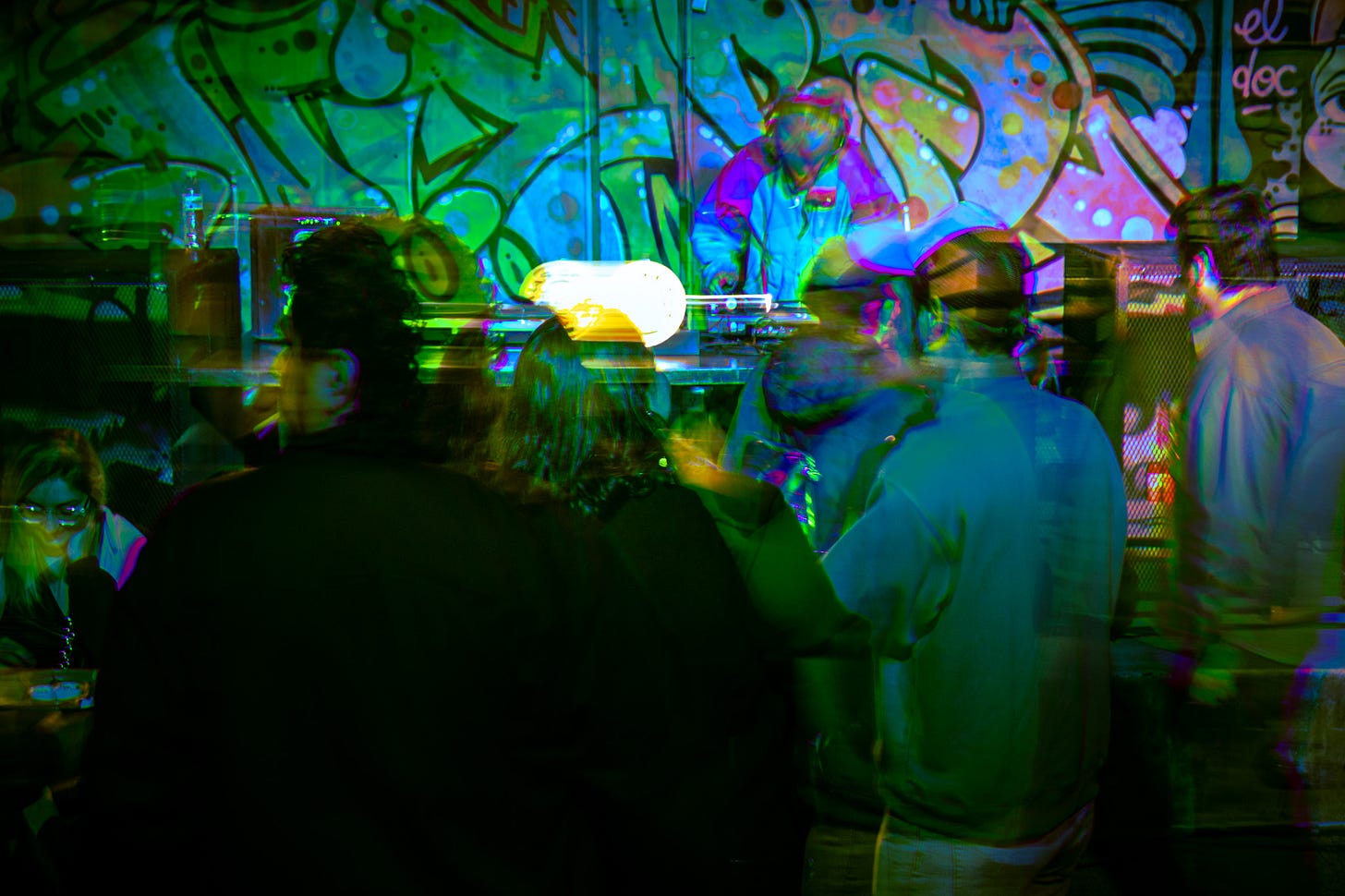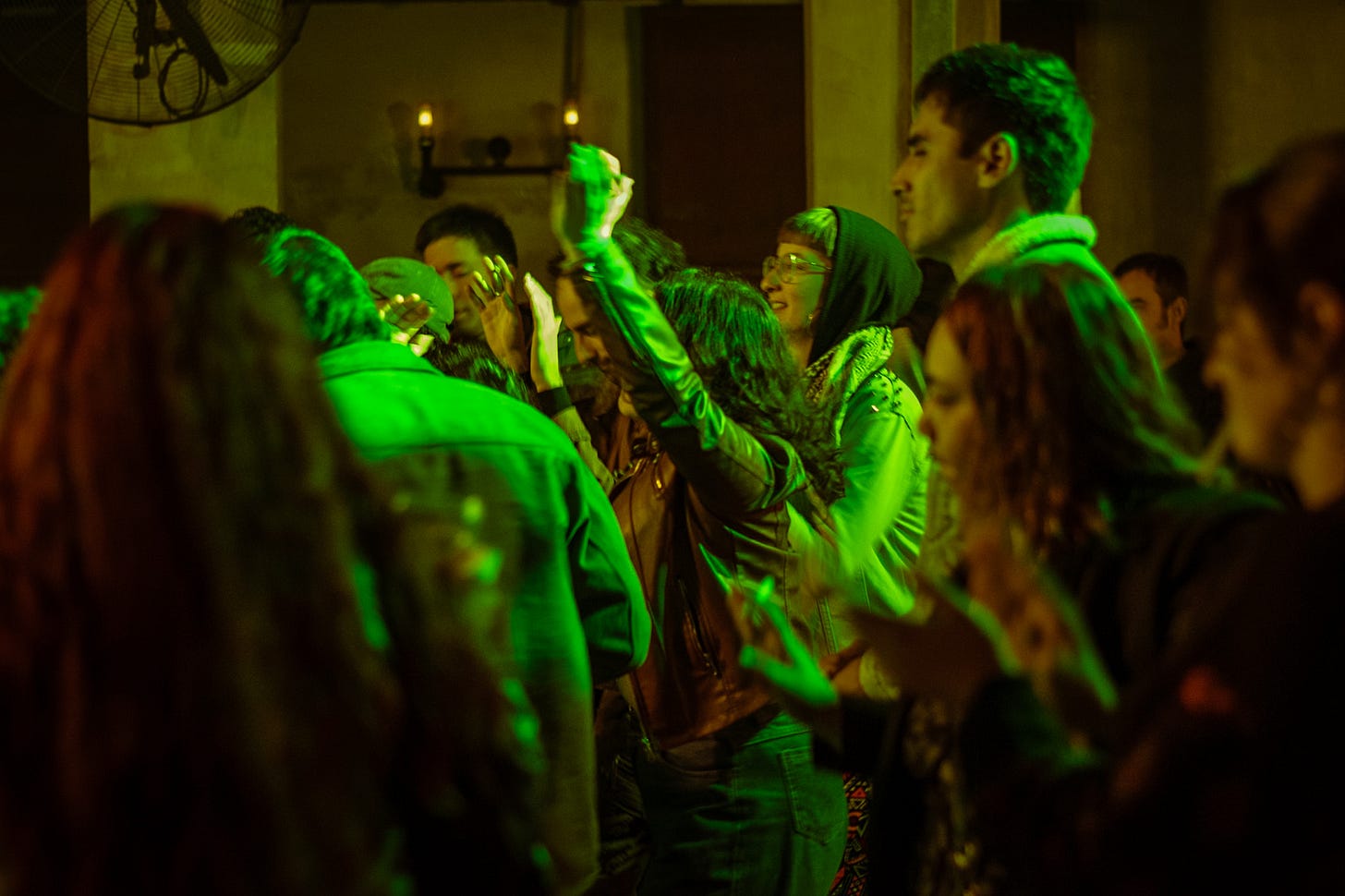Paraguay's Vinyl Revolution Is Female
Hijas de Púa are putting a new spin on vintage classics.
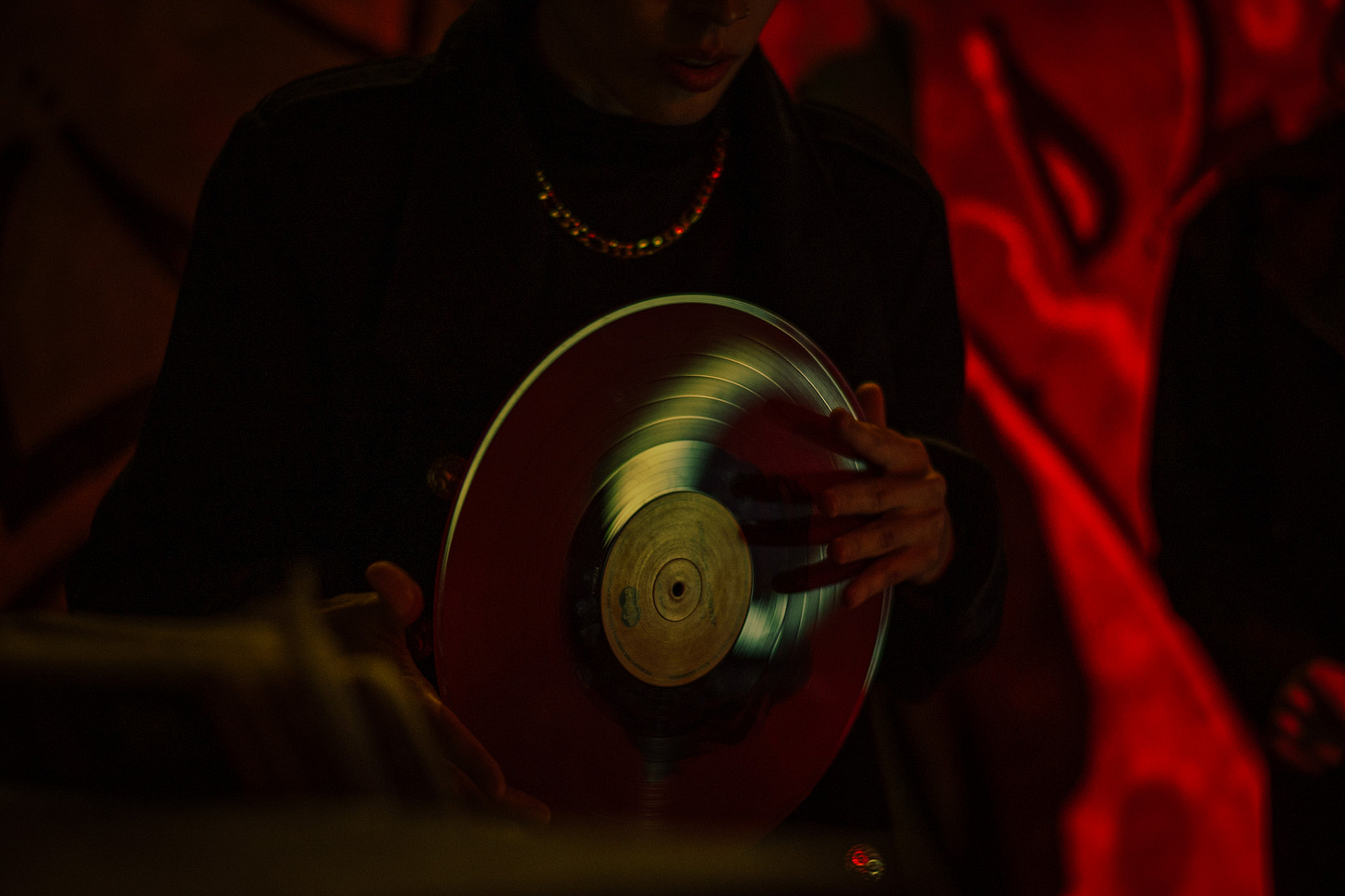
“Everyone’s here because they like weird stuff,” says a kid in between sips of beer, a Kraftwerk track, and the crowd stomping to the beat. It’s Friday night in a bar in downtown Asunción, the capital of Paraguay, and Hijas de Púa are playing.
This collective of female DJs is made up of Lauri Ramírez, Gea Cáceres, Jessi Centurión and Rocío Recalde. Their mission: to share their passion — or addiction, as they call it — for rare records, discover new sounds, learn from each other, and to carve out space in a scene dominated by mainstream nightspots and male selectors.
The night starts off low-key. As a series of headbangers blare out, people start to pull up, grab a drink, and find a spot, asking themselves: what comes next? The few seconds it takes to flip to a new tune leave everyone on tenterhooks.
The shine of a cell phone reveals someone trying to identify a golden oldie. “I already Shazammed three or four songs,” says its owner, meaning the app that works out the artist and track from a few seconds of audio. “There was one that I haven’t heard since I was a kid.”
Bringing rare and half-forgotten gems to the people is all in a night’s work for Hijas de Púa, whose name roughly translates as Needle Girls, and who recently celebrated their first anniversary.
“I think there are two kinds of DJs,” says Jessi. “Those who play what people want to hear, and those who play music they like and want other people to get to know. That’s us: we play tracks we love so other people can discover them.”


Each record has its own story, with the four ranging far and wide to source new additions: from a trip to Colombia, via rescuing records from a closing-down local radio station, to a flea market on calle Azara.
Gea fondly recalls one particularly fruitful spot: La Gloria Libros y Discos, a second-hand store on the corner of Montevideo and Haedo where she scored her first vinyl sometime in 2017. “I saw this room full of dusty old records and I started to flick through them. There was so much music that I loved; I bought three Chico Buarque records. I was so happy, even though I didn’t have a sound system to play them … and when I finally could, I began to fantasise about playing in front of people.”
For years, the four rarely listened to their growing archive, collecting out of sheer love for the analogue and vintage. But they gradually found spaces to make their first forays into DJing: mainly Christmas, Halloween and birthday parties, or in pokey bars downtown. Along the way, they started to pick up key skills like beatmatching: aligning the tempos of two records to create a seamless transition.
Then, in August 2024, Hijas de Púa was born. “I wanted to get together and chat with other women collectors,” Rocío recalls. “That’s when the idea started of forming a collective, something we could truly call our own.”
In Paraguay, spaces for independent musicians and DJs are few and far-between, especially when it comes to vinyl. Places to learn the craft are even rarer. “Something we’ve wanted to do for ages is a workshop where people can learn how to mix,” says Lauri.
As midnight approaches, the bar fills up. A helping of post-punk Argentine rockers Sumo raises the collective pulse, and those first few tentative steps turn into dancing. “I feel I can be myself here,” says a girl. Hijas de Púa feel the same way.
“DJing needs your full attention,” says Gea. “It completely absorbs you, but it’s fun at the same time.” Jessi agrees: “It’s like a videogame, you have to concentrate when you’re beatmatching. Sometimes I’m so immersed in that, then I look up and notice all the people and I suddenly get shy. But when you see they’re having a good time, it’s awesome.”

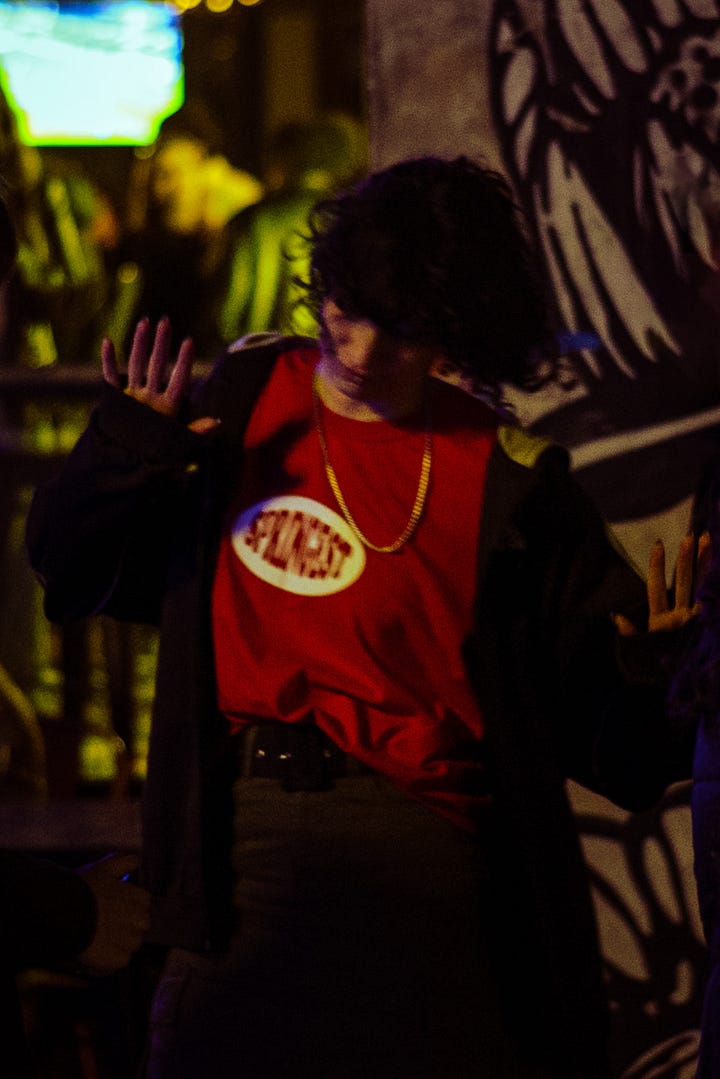
The night draws on and Jessi and Rocío hit the decks. The soundscape transforms, transporting us to tropical universe of cha-cha-chá, salsa and cumbia. Nobody can remain still for long. “It’s crazy, right?” reflects Rocío.
“I just put on songs that I like and think, ‘If they dance, great. If not, it’s still a banger.’ Either way, I have so much fun playing with everyone. Putting on a party together is the best.”
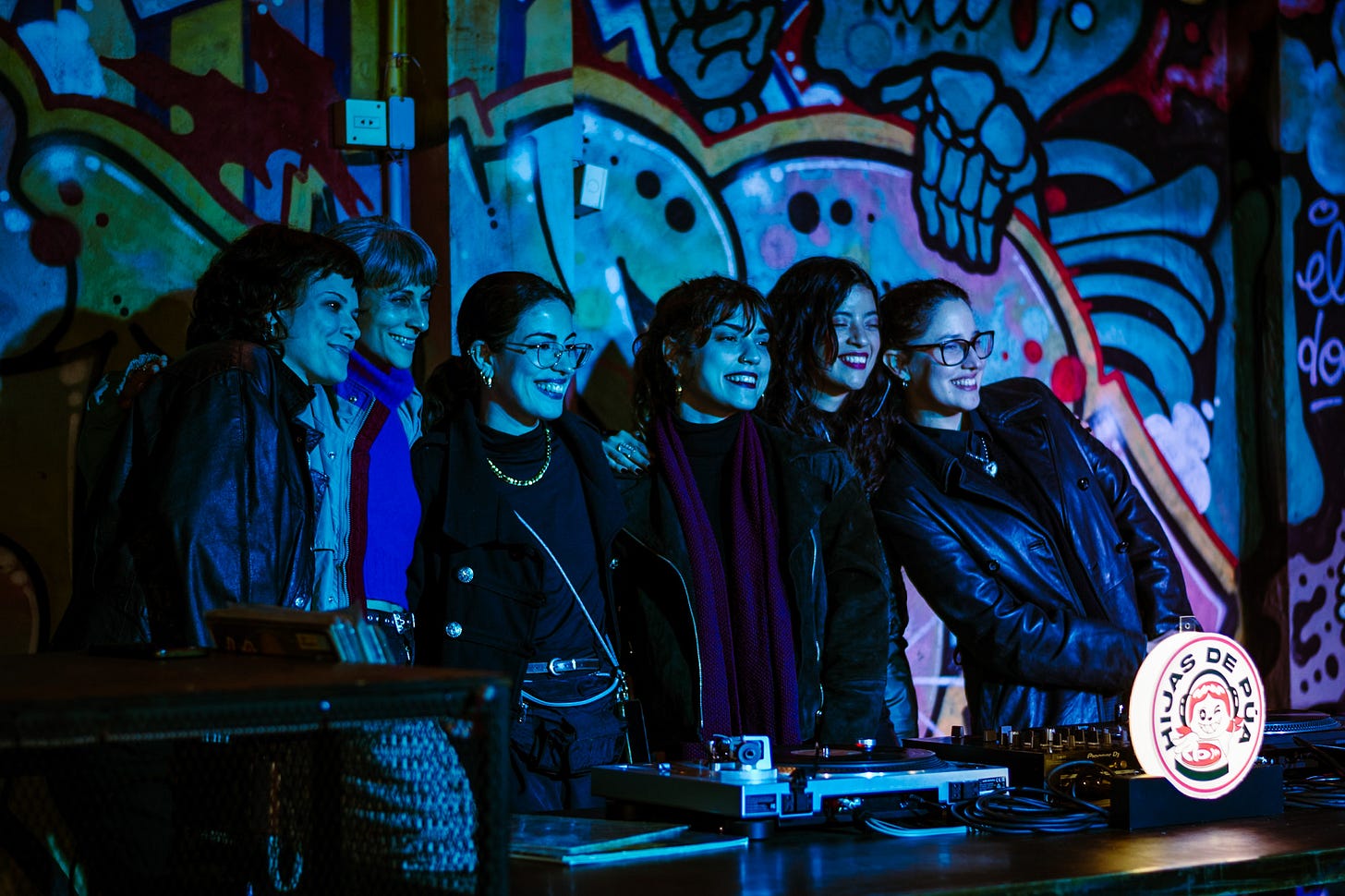
At 1:32 am the iconic riff of La Bamba rings out and the bar nearly explodes. The girls, alongside two guest DJs from São Paulo and Posadas, take a triumphant curtain call.
A polaroid remains in the mind’s eye: records spinning, cups of beer in the air, and a sorority of selectresses that have created their own movement.
“We did the hard part,” says Lauri. “Now we’ve got together, we’re not going anywhere.”



The Paraguay Post will be in conversation with Hijas de Púa and other leading female artists on Thursday, November 6 in Cascarón Bar.
To reserve your spot, and to get advance notice of future events, become a paid subscriber for the price of a bargain-bin record once a month:



